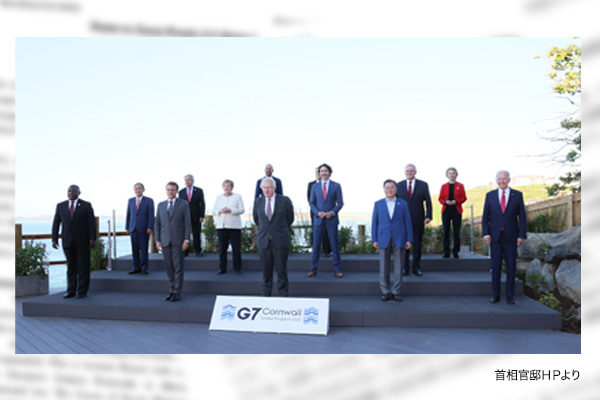Amid what U.S. President Joe Biden terms a confrontation between democracies and autocracies, the democratic camp has finally begun to take shape under the U.S. leadership after remaining vague. The Group of Seven leaders’ communique for 2021 published on June 13 after a three-day G7 summit covered various issues facing the world, but its key point was the request for China to secure peace and stability across the Taiwan Strait and respect human rights in the Xinjiang Uyghur autonomous region.
U.S.-led unity of democracies
At the G7 summit, Biden demonstrated the most hardline attitude against China among the leaders. In a background briefing for the White House press corps, a senior administration official introduced the Build Back Better World (B3W) initiative, a massive infrastructure investment plan to counter China’s Belt and Road Initiative (BRI), indicating that the U.S. government had carefully worked out the initiative prior to the summit meeting.
Among the G7 countries, Italy has joined the BRI. France, which had taken a relatively harsh attitude toward China, seemed to have insisted that the G7 communique should refrain from including provocative messages to China. Nevertheless, it is significant that the leaders’ communique clarified the attitude that democracies should take. This is because the G7 message will spill over to the North Atlantic Treaty Organization and the European Union.
“During my first year in office, the United States will organize and host a global Summit for Democracy to renew the spirit and shared purpose of the nations of the free world,” Biden wrote in Foreign Affairs magazine in 2020 before he was elected president, although it is unknown whether this commitment was based on a grand foreign policy strategy toward China.
The initiative to unite the U.S., its allies and other democracies to counter autocratic countries might have originated from this commitment. With China in mind, Taiwan was the key word in statements issued after a Japan-U.S. summit, a U.S.-South Korea summit and a “2 plus 2” meeting of Japanese and Australian foreign and defense ministers in recent months.
Japan lacking a sense of tension
On June 10, a day before the opening of the G7 summit, U.S. President Biden and British Prime Minister Boris Johnson announced the New Atlantic Charter after their talks. The document was named after the Atlantic Charter that then U.S. President Franklin Roosevelt and British Prime Minister Winston Churchill published in 1941 in anticipation of international order after World War II. The new charter emphasized that the U.S. and Britain resolve to defend the principles, values and institutions of democracy and open societies, making clear their rivalry with China and Russia. After the talks with Johnson, Biden said they reaffirmed “special relationship” between the U.S. and Britain. Johnson, who has harshly criticized China over Hong Kong and Uyghur issues, might have no objection to Biden’s characterization.
Twenty-one years ago, former U.S. Deputy Secretary of State Richard Armitage and 15 other U.S. scholars and experts on Japan compiled the so-called first Armitage report titled “The United States and Japan: Advancing toward a Mature Partnership,” calling on the two countries to develop bilateral relations in line with U.K.-U.S. ties. As U.S.-China confrontation deepens, Japan’s raison d’etre is growing naturally. Regrettably, however, I feel that Japan, lacking a sense of tension, might have no spirit in becoming an active player in the international community.
Tadae Takubo is Vice President of Japan Institute for National Fundamentals and a professor emeritus at Kyorin University.


